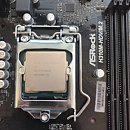Sunday, January 27th 2019

Intel Readies Energy-efficient 35-Watt Core i9-9900T Processor
Intel succeeded in bringing down the TDP of its 8-core/16-thread "Coffee Lake-Refresh" silicon all the way down to a staggering 35 W, from its currently rated 95 W, which in real-world usage easily exceeds 110 W, given Turbo Boost, and other performance enhancements enabled by DIY motherboards. The new Core i9-9900T achieves its TDP with a combination of significantly lower clock-speeds, and an aggressive on-die power-management system. Its nominal-clock is down to 1.70 GHz from 3.60 GHz of the original i9-9900K, while 1~2 core Turbo Boost frequency is down to 3.80 GHz from 5.00 GHz of the original. The all-core Turbo clock-speed could be as low as 3.30 GHz. Intel hasn't tinkered with the L3 cache amount, which is still set at 16 MB, and the UHD 630 iGPU retains its EU count and clock-speeds. The chip features its 4-character product code of QQC0.
Source:
Tom's Hardware

31 Comments on Intel Readies Energy-efficient 35-Watt Core i9-9900T Processor
In a mobile CPU it is important how low the power draw can go and this is not great in Ryzen, because the IF sucks a lot just to keep the thing going.
Moreover, the power management seems not to be that great, because Zen-powered notebooks lag behind Intel in both idle and load battery life.How do you measure power draw? :)No offense, but Razer, GB and MSI are so tiny that most PC owners don't know these brands exist. Asus is what... 5th? 6th?
-T CPUs are basically purpose-built for SFF desktops of the major OEMs. They will know how to setup them. Seriously, don't worry so much. :-)
I'm completly new to this. How do you measure the 36 w ? Thanks ! Yves-Marie
The bottom line is that this CPU is tuned for lower power draw and it won't boost the same way as a 95w or 130w part.